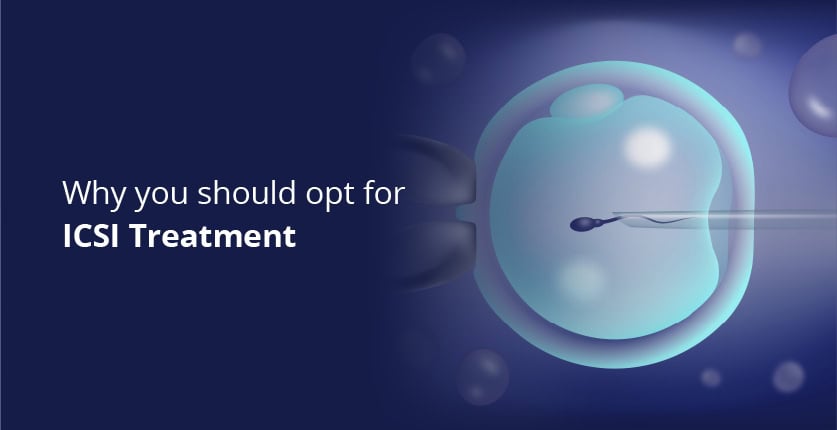Why you should opt for ICSI Treatment?
- Published on November 30, 2021

ICSI-IVF is a specialized form of in vitro fertilization that is used mostly commonly in cases of severe male infertility, after repeated failed fertilization attempts with conventional IVF, or after egg freezing (oocyte preservation). Pronounced ick-see IVF, ICSI stands for intracytoplasmic sperm injection.
During regular IVF, many sperm are placed together with an egg, in hopes that one of the sperm will enter and fertilize the egg on its own. With ICSI-IVF, the embryologist takes a single sperm and injects it directly into an egg.
Some fertility clinics recommend ICSI for every IVF cycle. Others reserve the treatment for those with severe male infertility or another medically indicated reason. There are good arguments against the routine use of ICSI. (The risks of ICSI-IVF are below.)
With that said, ICSI-IVF has enabled many infertile couples to get pregnant when, without it, they would not have been able to conceive using their own eggs and sperm.
- Very low sperm count (also known as oligospermia)
- Abnormally shaped sperm (also known as teratozoospermia)
- Poor sperm movement (also known as asthenozoospermia)
If a man does not have any sperm in his ejaculate, but he is producing sperm, they may be retrieved through testicular sperm extraction, or TESE. Sperm retrieved through TESE require the use of ICSI. ICSI is also used in cases of retrograde ejaculation if the sperm are retrieved from the man’s urine.
Severe male infertility isn’t the only reason ICSI-IVF is used. Other evidence-based reasons for ICSI include:
- Previous IVF cycle had few or no fertilized eggs: Sometimes, a good number of eggs are retrieved, and sperm counts look healthy, but no eggs get fertilized. In this case, during the next IVF cycle, ICSI may be tried.
- Frozen sperm are being used: If the thawed sperm don’t appear especially active, ICSI-IVF may be recommended.
- Frozen oocytes are being used: Vitrification of eggs can sometimes cause hardening of the egg’s shell. This may complicate fertilization, and IVF with ICSI may help overcome this hurdle.
- PGD is being done: PGD (preimplantation genetic diagnosis) is an IVF technology that allows for genetic screening of embryos. There is concern that regular fertilization techniques may cause sperm cells (who have not fertilized the egg) to “hang around” the embryo, and that this may interfere with accurate PGD results.
- IVM (in vitro maturation) is being used: IVM is an IVF technology where eggs are retrieved from the ovaries before they completely mature. They go through the final stages of maturation in the lab. Some research has found that IVM eggs may not become fertilized by sperm cells at rates comparable to traditional IVF. More research is needed, but it may be that IVM with ICSI is a good option.
IVF with ICSI can be a great technology when needed. However, there’s some disagreement on when it can and can’t improve success rates. Research is ongoing, but here are some situations that the American Society of Reproductive Medicine reports IVF with ICSI may not be warranted:
- Very few eggs retrieved: The concern is that with so few eggs, why take a risk that they won’t get fertilized? However, research has not found that pregnancy or live birth rates are improved when ICSI is used.
- Unexplained infertility: The logic behind using ICSI to treat unexplained infertility is that since we don’t know what is wrong, treating every possibility is a good plan of action. That said, so far research has not found that ICSI for unexplained infertility significantly improves live birth success rates.
- Advanced maternal age: There’s no current evidence that advanced maternal age impacts fertilization rates. Therefore, ICSI may not be necessary.
- Routine IVF-ICSI (ie, ICSI for everyone): Some reproductive endocrinologists believe that every patient should get ICSI to eliminate the possibility of fertilization failure. However, research has found that for every 33 patients, only one would benefit from routine use of IVF-ICSI. The rest would be receiving the treatment (and risks) without possible benefit.
Also Read: How to Prepare for ICSI Treatment?
ICSI is done as a part of IVF. Since ICSI is done in the lab, your IVF treatment won’t seem much different than an IVF treatment without ICSI.
As with regular IVF, you’ll take ovarian stimulating drugs, and your doctor will monitor your progress with blood tests and ultrasounds. Once you’ve grown enough good-sized follicles, you’ll have the egg retrieval, where eggs are removed from your ovaries with a specialized, ultrasound-guided needle.
Your partner will provide his sperm sample that same day (unless you’re using a sperm donor or previously frozen sperm.)
Once the eggs are retrieved, an embryologist will place the eggs in a special culture, and using a microscope and tiny needle, a single sperm will be injected into an egg. This will be done for each egg retrieved.
If fertilization takes place, and the embryos are healthy, an embryo or two will be transferred to your uterus, via a catheter placed through the cervix, two to five days after the retrieval.
ICSI-IVF comes with all the risks of a regular IVF cycle, but the ICSI procedure does introduce additional ones.
A normal pregnancy comes with a 1.5 to 3 percent risk of major birth defect. ICSI treatment carries a slightly increased risk of birth defects, but it’s still rare.
Some birth defects are more likely to occur with ICSI-IVF, specifically Beckwith-Wiedemann syndrome, Angelman syndrome, hypospadias, and sex chromosome abnormalities. They occur in less than 1 percent of babies conceived using ICSI with IVF.
There is also a slightly increased risk of a male baby having fertility problems in the future. This is because male infertility may be passed on genetically.
These additional risks are why many doctors are saying ICSI should not be used for every IVF cycle. It’s one thing if you need ICSI to conceive. Then, you can discuss with your doctors the pros and cons of using this assisted reproduction technology. However, if you can have a successful IVF cycle without ICSI, why risk even the slight increase in birth defects?
The ICSI procedure fertilizes 50 to 80 percent of eggs. You might assume all eggs get fertilized with ICSI-IVF, but they don’t. Fertilization isn’t guaranteed even when a sperm is injected into the egg.
Are there any risks involved?
The procedure of ICSI is universally considered to be one with low associated risks. However, ICSI does come with a set of its own risks and disadvantages, as is the case with any aspect of medicine.
Once the sperm is obtained, the male partner is not prone to any risk from the procedure. The only risks are with the techniques used for sperm retrieval, but they are negligible. Some known ICSI risk factors include:
- Embryo damage: Not all eggs that fertilize ends up in developing into healthy embryos. It is possible for some embryos and eggs to get damaged during the process of ICSI.
- Multiple pregnancy: Couples using ICSI along with IVF have a 30-35% increased chance of conceiving twin and 5%-10% chances of having triplets. When the mother carries multiples, there are increased risks of certain complications during pregnancy and childbirth, which includes high blood pressure, gestational diabetes, low amniotic fluid levels, premature labor or need of cesarean section.
- Birth defects: There is a 1.5%-3% risk of a major birth defect with normal pregnancy. The risk of birth defects is increased slightly with ICSI treatment, although its rare nonetheless.
It is because of these additional risks, a lot of doctors do not recommend the use of ICSI with every IVF cycle. It is understandable if ICSI is an absolute requirement for conceiving. If that is the case, make sure you consult your doctor regarding the advantages and disadvantages of using the technology. However, if it is possible to undergo an IVF cycle successfully, why should you risk something like a birth defect, no matter how negligible it is.
How successful the procedure completely depends on the individual patient and their health condition. Regardless, research shows that 25% of patients can conceive after just one attempt at ICSI. The procedure should be considered as a way to mingle the sperm and the egg, not as an assurance of pregnancy.
Related Posts
Written by:
Our Services
Fertility Treatments
Problems with fertility are both emotionally and medically challenging. At Birla Fertility & IVF, we focus on providing you with supportive, personalized care at every step of your journey towards becoming a parent.Male Infertility
Male factor infertility accounts for almost 40%-50% of all infertility cases. Decreased sperm function can be the result of genetic, lifestyle, medical or environmental factors. Fortunately, most causes of male factor infertility can be easily diagnosed and treated.We offer a comprehensive range of sperm retrieval procedures and treatments for couples with male factor infertility or sexual dysfunction.
Donor Services
We offer a comprehensive and supportive donor program to our patients who require donor sperm or donor eggs in their fertility treatments. We are partnered with reliable, government authorised banks to source quality assured donor samples which are carefully matched to you based on blood type and physical characteristics.Fertility Preservation
Whether you have made an active decision to delay parenthood or are about to undergo medical treatments that may affect your reproductive health, we can help you explore options to preserve your fertility for the future.Gynaecological Procedures
Some conditions that impact fertility in women such as blocked fallopian tubes, endometriosis, fibroids, and T-shaped uterus may be treatable with surgery. We offer a range of advanced laparoscopic and hysteroscopic procedures to diagnose and treat these issues.Genetics & Diagnostics
Complete range of basic and advanced fertility investigations to diagnose causes of male and female infertility, making way for personalized treatment plans.Our Blogs
To Know More
Speak to our experts and take your first steps towards parenthood. To book an appointment or to make an enquiry, please leave your details and we will get back to you.


































